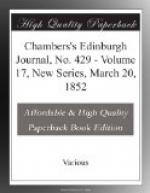One day, however, he left Montreaux, and stayed away nearly a fortnight. When he came back, he was not alone: he was accompanied by a young and lovely girl—one of those energetic but sweet creatures, whose influence would be supreme with a good man. Madeleine Sandeau was eighteen—tall, well-proportioned, and exceedingly handsome; she was, moreover, educated. Her father had taken her from school, to bring her to his house, which, though so different from what she was used to, she presided over at once with ease and nature. Great was the horror of the young girl when she found out the character of the people around her. She remonstrated freely with her father as to the dreadful nature of his life; but the old man was cold and inexorable. ‘He had brought her there to preside over his solitary house,’ he said, ‘and not to lecture him:’ and Madeleine was forced to be silent.
She saw at once the utter futility of any attempt to civilise or humanise the degraded beings she associated with; and so she took to the children. With great difficulty, she formed a school, and made it her daily labour to instil not only words, but ideas and principles, into the minds of the young, unfledged wreckers. She gained the goodwill of the elders, by nursing both young and old during their hours of sickness, as well as by a slight knowledge of medicine, which she had picked up in a way she never explained, but which always made her silent and sad when she thought of it.
When a black and gloomy night came round, and the whole village was on foot, then Madeleine locked herself in her room, knelt down, and remained in prayer. Now and then she would creep to the window, look out, and interrogate the gloom. She never came forth to greet her father on his return from these expeditions. Her heart revolted even against seeing her parent under such circumstances, and towards morning she went to bed—rarely, however, to sleep.
On one occasion, after a cold and bitter day, the evening came on suddenly. Black clouds covered the horizon as with a funeral pall; the wind began to howl round the hamlet with fearful violence; and Madeleine shuddered, for she knew what was to be expected that night. Scarcely had the gale commenced, when Pierre rose, put on a thick pea-jacket and a sou’-wester, armed himself, and swallowing a glass of brandy, went out. He was the last to leave the village; all the rest had preceded him. He found them encamped in a narrow gorge, round a huge fire, carefully concealed behind some rocks. It was a cold, windy, wet night; but the wreckers cared not, for the wind blew dead on shore, and gave rich promise of reward for whatever they might endure.
A man lay on the look-out at the mouth of the gorge under a tarpaulin. He had a night-glass in his hand, with which he swept the dark horizon, for some time in vain. But the wind was too good to fail them, and the wreckers had patience.




